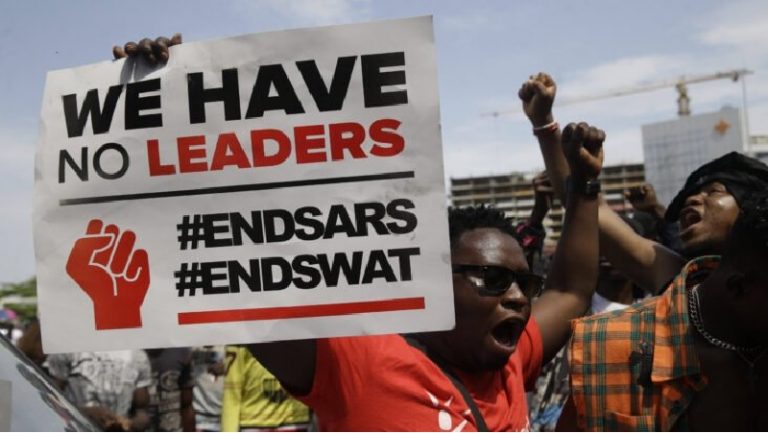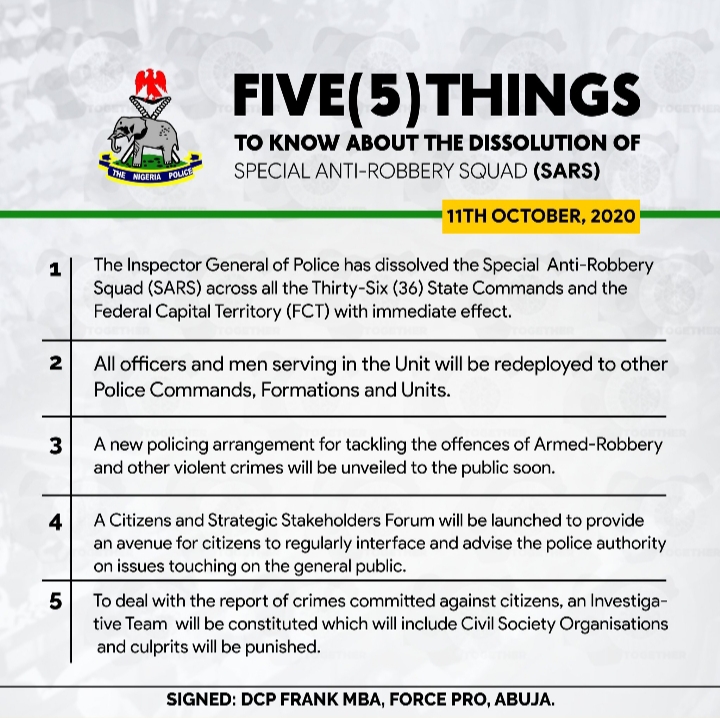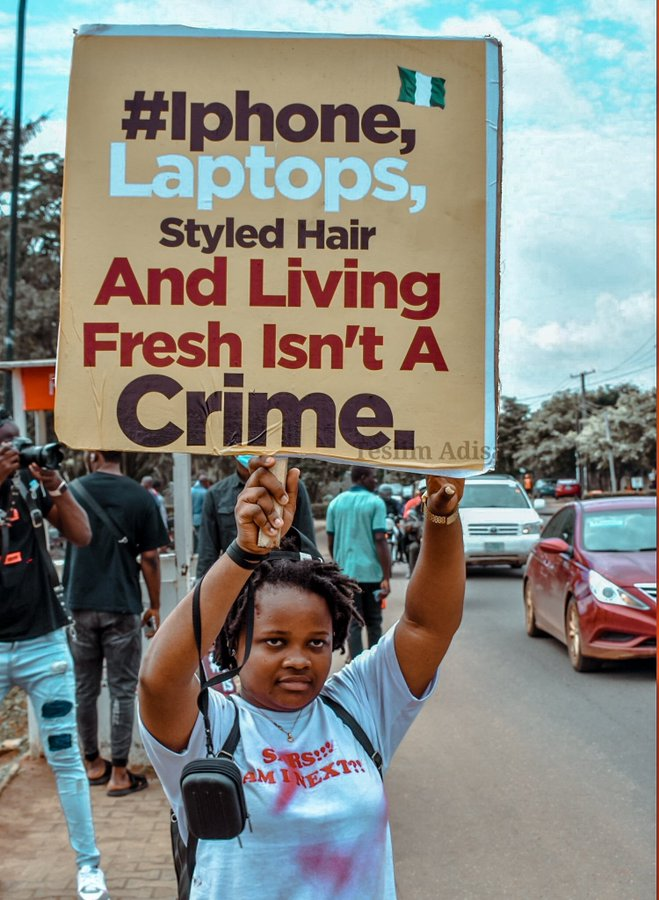
It is a known fact that for solutions to be sustainable, long term thinking is required and this begins with identifying the root cause of the problem so as to set a right road map in place.
However, when there are issues of urgent concern that require immediate response, the right thing to do is to swing into action as with first aid. No one gets to an emergency scene and begins asking questions with the intent for extended research. The first thing to do is to act based on what you can see: stop the bleeding, stop the suicide attempt, save the baby etc. The remaining part of the research can be handled thereafter.
This is the case with the #EndSARS movement. Some people have said it’s not just about ending SARS and that is fair enough. However, that is a great start. We need that first aid, that bandage to nip Police Brutality in Nigeria in the bud.
Register for Tekedia Mini-MBA edition 19 (Feb 9 – May 2, 2026): big discounts for early bird.
Tekedia AI in Business Masterclass opens registrations.
Join Tekedia Capital Syndicate and co-invest in great global startups.
Register for Tekedia AI Lab: From Technical Design to Deployment (next edition begins Jan 24 2026).
With a predominantly youth population, Nigeria is one of the youngest countries on earth having a median age of 18.3. In an ideal situation, a nation like ours will enjoy high economic development, considering the availability of its vibrant work force to contribute to economic activities productively.
However, this demographic dividend also portends huge potential for crime in situations where the youths are not productively engaged and the nation is ravaged by poverty. When corruption is the order of the day, and whole systems are broken, there’s bound to be a breakdown of law and order.
Subsequently, Police will need to step up their effort to avoid a state of lawlessness because youths are naturally restless and their energy must be channeled to something – productive or not.

This is the case in Nigeria. The strength of our youth has not been managed effectively and now, we’re deploying police to curb what not, targeting any youth that doesn’t fit into their supposed profile of what clean should look like.
Back to our analogy on first aid. After the first aid, the urgent action, the patient’s health will require in-depth analysis to understand the underlying issues. Stopping at just the first aid will mean lost opportunity to finally proffer a lasting solution to elongate the patient’s life. Nonetheless, skipping the first aid and focusing straight on analysis and research may mark an urgent disaster.
There have been massive protests in Nigeria calling for the disbandment of the Special Anti-Robbery Squad, a section of the Nigerian Police Force charged with curbing armed robbery. While experiences of protesters and their loved ones vary, the reason for this all important request remains the same: young people, and not just the robbers the SARS was set up to manage, are now targets and victims of brutality in the hands of these men of the force.
Contrary to what most people think, the situation is actually a simple yet sensitive one. Simple in the sense that there is absolutely no justification for police brutality but sensitive because the current state of the nation requires a high level of security to protect lives and property. We all know that while a lot of people go into crime because of poverty and lack, the case is not the same with all. At any rate, crime against your fellow humans, people working hard and trying their best to put food on their tables and support their families is unjustifiable for any reason.
In consonance with the complexity of the situation, it is important to also proffer a holistic approach to tackling the challenges.
Thus, in analyzing the root cause of the circumstances that have finally culminated into these mass protests that are gradually becoming deadly, with deaths already recorded from the bullets of police men, some fundamental issues need to be addressed.
A lot of people have alluded to the fact that the state of the police, the protests and indeed the hopelessness of our youth is a direct reflection of the nation. Like symptoms, these are only pointers to the true health status of Nigeria.
Nigeria is indeed a paradox of a nation. A country that is now recognized as the poverty capital of the world is also home to the richest black man and indeed some of the richest black people in the world. A country that attracts the best entrepreneurs in the world but also repels its own people due to lack of opportunities. Isn’t it amazing that Nigerians are some of the best groups when it comes to impact in countries like America but seem to be unproductive at home? In Nigeria, you walk from opulence into slums with mere gates as the divide!
To begin with, we cannot tackle any of the issues highlighted without narrowing squarely on poverty and inequality. True, Nigeria has been dubbed the largest economy is Africa but we all know this does not translate to anything substantial for the man on the street.
Addressing the level of poverty in Nigeria requires restructuring of systems, collaborative effort, with the leaders having the political will to champion and support the process without politicizing the issues.
Going by the pressing issue, a great starting point is the absolute reformation of the police force. Police welfare in Nigeria is beyond despicable. You have grown men earning meager salaries not enough to live by and then you hand them guns! Some years back, a television station in the country did a quasi documentary about the state of the police college and it was indeed a terrible sight to behold. In the end, nothing changed, instead they got a backlash from the government.
The reformation of the police force must happen from end to end: From the entry point, the police college, to the salary, welfare and training of serving police officers, pensions of retired officers, compensation for families of those who die in active service to provision of standard tools, gadgets and weapons amongst others.
Next is the total overhaul of the education system which is currently in shambles. The government needs to rally private sector partnerships and put the right policies and incentives in place to attract investment into this all important foundation of our nation. The backwardness and stagnation of the country is directly linked to the poor level of our education standard and total lack of it in most quarters.
Closely linked to this is the need to set up youth development and empowerment schemes. We need urgent action in this area to reduce poverty and youth restiveness across the states. Nigeria is blessed with natural resources and our skill acquisition schemes should be focused on providing youths in different areas with the know-how to effectively leverage the resources in their states for export and local consumption where applicable.
Again, without the government providing the enabling environment for businesses to thrive, no matter the education or skills acquired, once the ease of doing business is low, there will be no adequate jobs to mop up unemployment. Government policies or lack of them have a huge impact on businesses. They have the capacity to advance businesses beyond the level of the owners’ self-survival to truly thriving businesses that can create more job opportunities and contribute good taxes for national development.
Additionally, one of the challenges Nigeria has faced when it comes to export and even local consumption of goods is quality and standard. We need the combined efforts of business councils, NGOs, industry players and the Government working with existing bodies like the SON, the Nigerian Export Promotion Council, NAFDAC and others to put in effective and seamless product standardization policies in place to aid exportation and local acceptance. This is important to help us not only diversify our economy from oil, but to also shore up the Naira from FOREX shocks.
From a political standpoint, Nigeria needs to have a more inclusive government where youth representation matters. Even if anyone had doubts, with the coordination and organization of the protests, Nigerian youths have shown that beyond being leaders of tomorrow, they are ready to take the country to the promised land, for the now and for future generations.
Ultimately, Nigeria needs to have improved justice and Judicial systems. To feel safe enough in Nigeria to serve with all our might and recreate a nation we can all be proud of across sectors, we need to push for the tenets of Goal 16 of the UN SDGs, Peace, Justice and Strong Institutions.
Essentially, we need active institutionalization and enforcement of the Rule of Law. All citizens need to trust that justice will be served, no matter who is on either side. All citizens need to know that no one guilty of crime will slip away because of their privileged position or standing or because of poor structure and systems to bring wrongdoers to book.
The focus on justice is particularly important because, as much as we speak in favour of police welfare in Nigeria and rightfully so, many a times, the culture of extended neglect and denied justice can fuel crimes and misconduct. In the United States of America for example, police welfare cannot be said to be poor but American police brutality, especially against the blacks, is one of the highest in the world.
In Nigeria also, many years of injustice, neglect and citizens’ indifference as regards accountability from political leaders have increased the level of complacency and nourished the culture of poor leadership across all spheres of the nation. Youths especially feel betrayed, have deep distrust for the leaders, with many having lost any iota of hope in the systems. This is highly expected considering the many years of unfulfilled promises, government after government.

Nigeria is however at a critical tipping point and history is being re-written by Nigerian youths. Many have advised that, with the youths finally getting the attention of those in high places and their being voices heard, the #endsars and #endpolicebrutality protests should be explored to push for total reforms across all critical systems of the nation.
2020 has indeed been a year of many learnings and discoveries. From COVID-19, its safety rules and periods of lockdown, to new levels of digitization in spheres never thought possible, Protest EndSARS will also go down as one of the landmarks of the year and its effects can definitely not be wished off.
One thing is certain: this season has marked the beginning of a new Nigeria. The voices of the youths have gone up in protests and in prayers, peacefully demanding a new type of leadership. The response from our leaders will set the tone for how things will proceed going forward.
At any rate, the youths must not lose the opportunity of the season for the rebirth of a new Nigeria; a Nigeria where according to Aisha Yesufu, “the son of a nobody can become somebody without knowing anybody’’.



